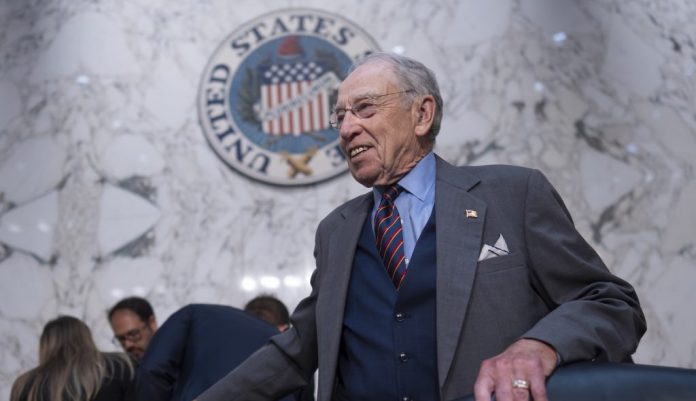Elections on the ballot: Seven states looking to break partisan control – Washington Examiner
Seven U.S. states are planning to vote on various ballot measures aimed at reducing partisanship in election and governance processes. These reforms include tackling issues such as gerrymandering, the structure of primary elections, and the implementation of different voting systems like ranked choice voting.
In Ohio, a significant measure is proposed to overhaul the current Ohio Redistricting Commission, which is controlled by a Republican majority and has been responsible for creating legislative and congressional maps. The proposed amendment would establish a citizen-led commission to handle redistricting, aiming to create fairer electoral districts. This change reflects concerns that a large portion of Ohioans live in districts with little electoral competition, which are seen as a consequence of garnished districts.
Moreover, several states including Arizona and South Dakota are considering reforms to their primary election systems. These measures would shift from closed and semi-closed primaries to more inclusive arrangements that allow greater participation from independent voters and possibly adopt a system where voters can choose more than one candidate.
Furthermore, Colorado, Idaho, Montana, and Nevada are not only looking to open up their primaries but are also exploring the adoption of ranked choice voting. This system moves away from winner-take-all elections, potentially allowing for a broader representation of voter preferences in election outcomes.
These initiatives reflect a broader push across the country to create more democratic and less partisan election systems, helping to ensure that electoral outcomes better reflect the will of all constituents.
Seven states are looking to reform some of their election and governance rules to move away from partisanship via several ballot measures.
Voters from across the country appear likely to vote on reforms related to gerrymandering, closed and semi-closed primaries, and winner-take-all voting.
Here are some ballot measures people will vote on.
Gerrymandering
The deadline is approaching for a ballot initiative in Ohio in which voters would decide whether to replace the heavily partisan Ohio Redistricting Commission with a citizen-led redistricting commission. If approved, it would be enshrined in the state’s constitution.
The commission has been built on a GOP majority, with Republicans like Gov. Mike DeWine, state Senate President Matt Huffman, former House Speaker Bob Cupp, and state Secretary of State Frank LaRose all having served on the commission during some or all of the proceedings over the past two years in which the commission passed six legislative maps and two congressional maps.
“An overwhelming majority of Ohioans will cast ballots this November in legislative districts that were drawn to lock in general election outcomes, and few districts featured meaningful primary contests,” a report from the Brennan Center for Justice at New York University’s law school stated. “These are the predictable consequences of living in a gerrymandered state.”
Seventy-seven percent of Ohioans live in “districts where elections for state representatives are not in serious dispute,” according to the report.
Closed and semi-closed primaries
Twelve states have closed primaries, and a handful of other states have semi-closed primaries, in which independent voters can vote in either party’s primary, but registered partisans may not cast ballots for the other side. In a closed primary, independents are boxed out of the voting process because a voter must be registered with a party to cast a ballot.
Voters in six states will vote on doing away with closed or semi-closed primaries. In Arizona, the “Make Elections Fair Arizona Act” would give the state open primaries, as the state has semi-open primaries in which independents can choose which party to affiliate with for ballot purposes.
South Dakota voters will also be given the chance to change their closed primaries to an open format.
Colorado, Idaho, Montana, and Nevada would move away from closed primaries in their ballot initiatives but also give voters a chance to vote for more than one candidate in a way.
Ranked choice voting
In addition to doing away with the closed and semi-closed primary system, the ballot initiatives in Colorado, Idaho, Montana, and Nevada would move away from the winner-take-all voting systems toward more of a ranked choice system.
If it is approved, Nevada will vote on the top five candidates in order of preference. A candidate would need to win a simple majority to win the primary, with a process of elimination occurring until one can win, with the person receiving the least votes being eliminated and those votes being redistributed to those voters’ second choice, and so on.
The Colorado ballot measure would allow voters to rank their top four candidates in order of preference in a single primary regardless of party affiliation. A similar process of elimination would occur in Colorado to get one candidate a simple majority.
CLICK HERE TO READ MORE FROM THE WASHINGTON EXAMINER
Organizers in Idaho said they have enough signatures to place an initiative on the ballot that would create a single primary and a ranked choice voting system open to all, regardless of party affiliation. It would use a similar runoff method as Nevada and Colorado have proposed to determine majorities if one is not initially clear.
Montana would also move toward ranking four candidates with all parties running in the same primary. Candidates can choose to or not to list their political affiliation, and the four winners would advance to the general election.
" Conservative News Daily does not always share or support the views and opinions expressed here; they are just those of the writer."




